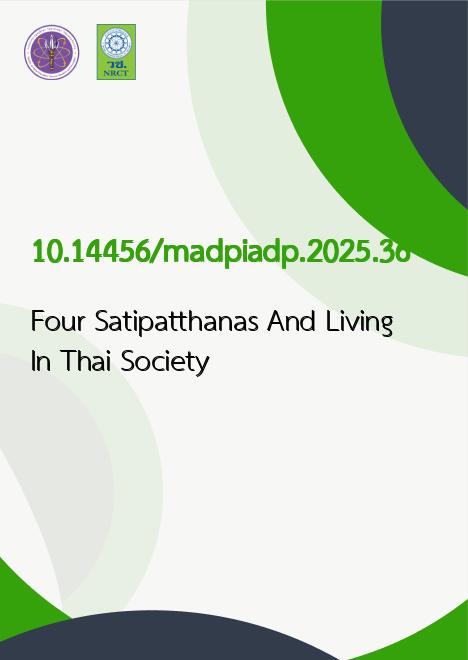
|
Four Satipatthanas And Living In Thai Society |
|---|---|
| รหัสดีโอไอ | |
| Creator | PhrakruSangkarakThammanusorn Thammanusarano |
| Title | Four Satipatthanas And Living In Thai Society |
| Contributor | Phra Rajakhemakorn |
| Publisher | DR.KET Institute of Academic Development and Promotion |
| Publication Year | 2568 |
| Journal Title | Modern Academic Development and Promotion Journal |
| Journal Vol. | 3 |
| Journal No. | 2 |
| Page no. | 128-141 |
| Keyword | The Four Satipatthanas, daily life, Thai society |
| URL Website | https://so12.tci-thaijo.org/index.php/MADPIADP/ |
| Website title | https://so12.tci-thaijo.org/index.php/MADPIADP/ |
| ISSN | 2822-1095 |
| Abstract | This research article employed literature review and descriptive data analysis based on Buddhist philosophy and relevant research to provide an in-depth understanding of the Four Foundations of Mindfulness (Satipaṭṭhāna)’s role in Thai society. They involve mindfulness practice by considering impermanence, unsatisfactoriness, and non-self of things. There are 4 aspects of Satipaṭṭhāna : (1) Contemplation of the body (kāyānupassanā) perceiving the body as a mere combination of elements; (2) Contemplation of feelings (vedanānupassanā) recognizing feelings as mere sensations; (3) Contemplation of the mind (cittānupassanā) observing the mind’s natural states; and (4) Contemplation of mental objects (dhammānupassanā) understanding phenomena according to their arising and cessation based on causal conditions. It investigates the role and advantages of the Four Foundations of Mindfulness as a Buddhist practice, as well as their application in modern Thai context, highlighting the importance of mindfulness in daily life, mental well-being, interpersonal relationships, and social harmony.The adaptation of Four Foundations of Mindfulness in alignment with changing lifestyle resulting from economic factors, technological advancements, and shifts in societal values is also emphasized.This article illustrates the importance of Foundations of Mindfulness (Satipaṭṭhāna) in Thai daily life, especially its role in promoting morality, ethics, and social balance at individual, family, and society levels. The principles of the Four Foundations of Mindfulness in Buddhist psychology paradigm are also described, as well as an analysis of how they are applied in modern Thai people's daily lives, including challenges and limitations. Practicing mindfulness through contemplation of the body (kāyānupassanā), feelings (vedanānupassanā), mind (cittānupassanā), and mental objects (dhammānupassanā) enhances self-awareness, improves understanding of others, reduces conflicts, and strengthens social relationships. Applying these principles is essential for leading a mindful and balanced life. |